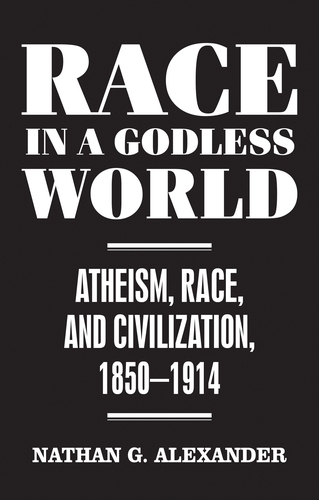
Race in a Godless World: Atheism, Race, and Civilization, 18501914
(Hardback)
Publishing Details
Race in a Godless World: Atheism, Race, and Civilization, 18501914
By (Author) Nathan Alexander
Manchester University Press
Manchester University Press
13th September 2019
United Kingdom
Classifications
Physical Properties
Hardback
304
Width 138mm, Height 216mm
Description
This is the first historical analysis of the racial views of atheists and freethinkers. Focusing on Britain and the United States in the second half of the nineteenth century, it covers racial and evolutionary science, imperialism, slavery and segregation in the United States, immigration debates and racial prejudice in theory and practice. -- .
Reviews
'Race in a Godless World is a great contribution to the study of historical atheism, but also intellectual and religious history. It is timely, balanced, well-researched, laying bare the wide range of racial views atheists held.'
Global Intellectual History
'The book will be of interest to both scholars and general readers, who are likely to find this alternative narrative of the origins of racism in Britain and the United States as compelling as it is convincing.'
The Journal of American History
'Race in a Godless World is a timely and important contribution to a growing field.'
The American Historical Review
Race in a Godless World is an excellent study. This is intellectual history at its best, demonstrating how the discriminated against minority of unbelievers, at the foot of the religious pecking order, challenged racial hierarchies and championed racial minorities. The book shows that a commitment to science and reason underpinned racial views amongst both atheist and religionist intellectuals of the nineteenth century. But scepticism and contrariness drew atheists to apply the same reason in shifting towards a more inclusive and progressive social agenda. With a strong structure and vivid clarity, this is the best contribution so far to scholarly study of how racist thinking came to be linked with, but also rejected by, atheists in the USA and Britain.
Callum G. Brown, University of Glasgow
An exhaustively researched and gracefully written book that makes a signal contribution to our understanding of the intersection of atheism and racial thought. The first book to fully flesh out the ties between racial thought and atheism, it is a masterful achievement that will be required reading for students and scholars of race, freethought, and British and American history more broadly.
Christopher Cameron, University of North Carolina at Charlotte
Situating the history of freethought in a fully transatlantic framework, Alexander carefully unpacks the ambivalences and contradictions of white atheist views on race and civilisation. Certain about the superiority of science over Christianity, freethinkers were far less clear about the racial and cross-cultural implications of their irreligion. Many embraced scientific racism and white supremacy, while others resisted xenophobia and race prejudice. Alexander captures these secularist complexities with admirable nuance and insight.
Leigh E. Schmidt, Washington University in St. Louis
Author Bio
Nathan G. Alexander is a Postdoctoral Fellow at the Max Weber Centre for Advanced Cultural and Social Studies, University of Erfurt, Germany
